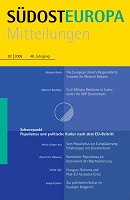Rumänien: Populismus als Instrument der Machtsicherung
Romania: Populism as an Instrument for Securing Power
Author(s): Anneli Ute GabanyiSubject(s): Politics / Political Sciences
Published by: Südosteuropa Gesellschaft e.V.
Summary/Abstract: Over the past few years, the spectre of populism has been haunting Europe threatening to hamper the emergence of democratic systems in the new EU-, formerly communist East European member countries and the coherence of the enlarged European Union as well. According to the author, populism is defined as a political code directed against the values and institutions of modern representative democracy in order to capture or to maintain political power. The paper analyzes the development of anti-democratic populism in Romania taking the specifics of the pre-1989 communist regime of Nicolae Ceausescu as a starting point. The popular uprising overthrowing the regime which took place in December 1989 served as a springboard for the coup d’état staged by an anti-Ceausescu counter-elite and was used as a populist argument by exactly that counter-elite to legitimize its violent takeover. Since then, populism has played an increasingly important role during election campaigns in Romania, culminating in the 2004 campaign for parliamentary and presidential elections. It is in particular the overall populist strategy of the newly elected Romanian president Traian Basescu which challenges the country’s political system of representative democracy and the division of power between the institutions in favour of the presidential prerogatives. Moreover, this strategy has created a climate of political instability and social polarization thus posing a danger for the accountability of Romania’s foreign policy.
Journal: Südosteuropa Mitteilungen
- Issue Year: 2008
- Issue No: 02
- Page Range: 56-67
- Page Count: 12
- Language: German
- Content File-PDF

